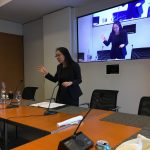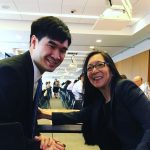Once again, Judge Pamela Chen led a lively conversation, this time at Debevoise & Plimpton’s APA Heritage Month Luncheon on May 11. As the first openly gay Asian American federal judge, she shared with us a bit of her personal story as daughter of American-educated Chinese immigrants who were forced to stay in America due to China’s inhospitable political climate. She used to joke that when her classmates’ parents would speak about far-off hungry people living in third-world China, her parents would name names.
Considering the predicament of Asian Americans in the law, Judge Chen first offered her view from the bench in support of a judiciary that accurately represents the country that they serve. She reported that Asian Americans still remain drastically underrepresented in the judiciary, though President Barack Obama has made astounding efforts to diversify the bench. Then she introduced a new term for the bamboo ceiling (which describes the dearth of Asian Americans in leadership roles at the highest levels of the profession) – sticky rice floor, illustrating an Asian American lawyer who works and works and works and is never able to get his career off the ground. Hopefully, attorneys of all backgrounds will be able to advance enough in the coming years to render that term obsolete, but unfortunately, it still applies.
Judge Chen then delved into a deeper discussion on the fuzzy definition of diversity versus racial balancing and specifically how Asian Americans have been a part of the history of race-consciousness in school admissions. While historically Asian Americans benefited from Affirmative Action policies, they are currently in a tough predicament where they now must outcompete their peers at higher levels than any other racial group (including white Americans) due to this idea of “overrepresentation”. The Asian American community is thus currently divided in support and against the idea of racial balancing in school admissions: Does the community rally in support of other people of color and policies that have advanced equality and addressed racial discrimination, or does the current disadvantage of Asian Americans signal a failing in race-conscious admissions? Rather than providing a clear opinion one way or another, Judge Chen traced the historical arguments and expanded upon the idea that Asian Americans have been used as a wedge between white Americans and other minorities on both sides of the issue.
Thank you to Judge Chen for entertaining us for an afternoon and illuminating multiple points of view regarding the abstract concept of diversity. Thank you to Debevoise & Plimpton for hosting such a lively luncheon.




